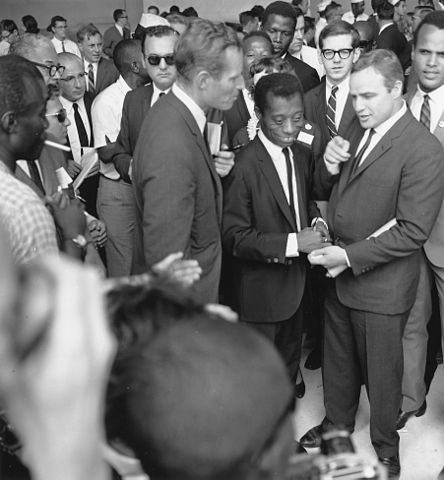In 1963, James Baldwin published “A Talk to Teachers” in Saturday Review. (When he gave the speech, Baldwin called it “The Negro Child–His Self-Image.”) As many of his essays did, this piece showed America as it was, not as it was imagined or mythologized. Sadly, his reminders remain relevant half a century later.
“The purpose of education, finally,” Baldwin asserted, “is to create in a person the ability to look at the world for himself, to make his own decisions, to say to himself this is black or this is white, to decide for himself whether there is a God in heaven or not. To ask questions of the universe, and then learn to live with those questions, is the way he achieves his own identity.”

James Baldwin at the March on Washington, 1963. (By U.S. Information Agency. Press and Publications Service. (ca. 1953 – ca. 1978) – NARA – ARC Identifier: 542051 [1], Public Domain, https://commons.wikimedia.org/w/index.php?curid=146587)
But then he added: “But no society is really anxious to have that kind of person around. What societies really, ideally, want is a citizenry which will simply obey the rules of society.” Obedience may minimize social disruption but costs us incalculably. We become–just look at us–a nation not rooted in the past as it happened, but one mired in myth. And bound by myth, we misunderstand what we see and who we are.
We are an unequal society, by design. Slavery and all that came after, Baldwin noted, “was not an accident, it was not an act of God, it was not done by well-meaning people muddling into something which they didn’t understand.” Baldwin pointed out that a “deliberate policy” made inequality in America. A difficult, but honest, look back reveals “white rage” fueling and maintaining American inequality, as Carol Anderson has powerfully put it. Many still refuse to understand this. Education can help with this but so would a national inquiry into reparations as Ta-Nehisi Coates has called for. Learning might liberate an individual and a society from ignorance.
But that’s risky, for as Baldwin recognized, “precisely at the point when you begin to develop a conscience, you must find yourself at war with your society. It is your responsibility to change society if you think of yourself as an educated person.” It follows that the status quo doesn’t want society changed. Therefore, those conservative forces might weaken and undermine education to forestall the revolutionary questioning education, at its true purpose, seeks.
So, what would Baldwin do? If given a chance, Baldwin said he would have told a young black student that he is
stronger than this conspiracy and he must never make his peace with it. . . . I would teach him that the press he reads is not as free as it says it is–and that he can do something about that, too. I would try to make him know that just as American history is longer, larger, more various, more beautiful, and more terrible than anything anyone has ever said about it, so is the world larger, more daring, more beautiful, and more terrible, but principally larger–and that it belongs to him.
For those of us who teach, this is one of our responsibilities; we are–or could be–in the business of empowerment and revolution.
As he concluded, Baldwin said, “[I]f America is going to become a nation, she must find a way–and this child must help her to find a way–to use the tremendous potential and tremendous energy which this child represents. If this country does not find a way to use that energy, it will be destroyed by that energy.” Ever prescient, Baldwin spoke at a pivotal moment. The Supreme Court ordered desegregation almost a full decade before in Brown v. Board of Education, Topeka, Kansas (1954) but civil rights violations continued through legislative and violent channels. Patience wore thin.
Patience wears thin still. The nation remains at risk of being consumed by this energy, a vast storehouse of barely tapped talent that, if loosened, might achieve our country as Baldwin put it The Fire Next Time:
If we–and now I mean the relatively conscious whites and the relatively conscious blacks, who must, like lovers, insist on, or create, the consciousness of the others–do not falter in our duty now, we may be able, handful that we are, to end the racial nightmare, and achieve our country, and change the history of the world.
Our duty is clear.